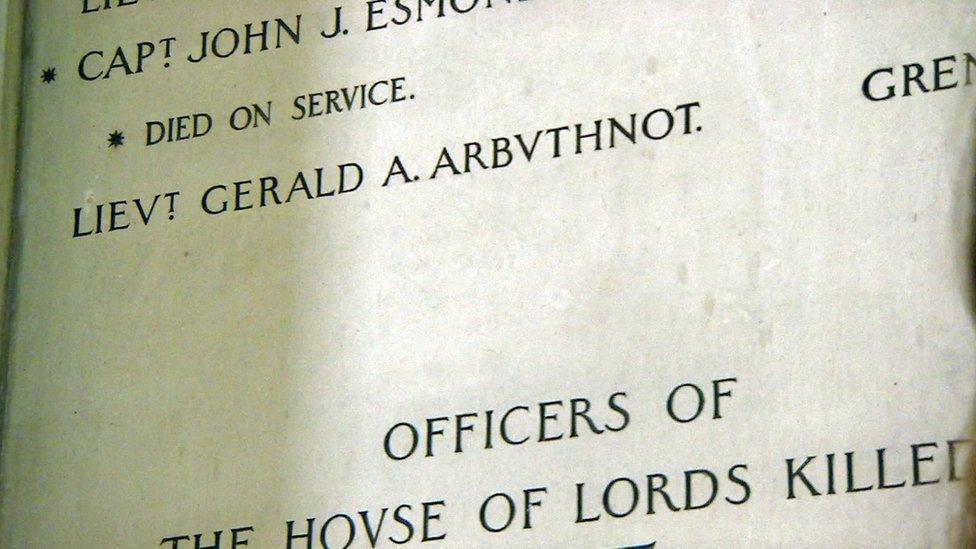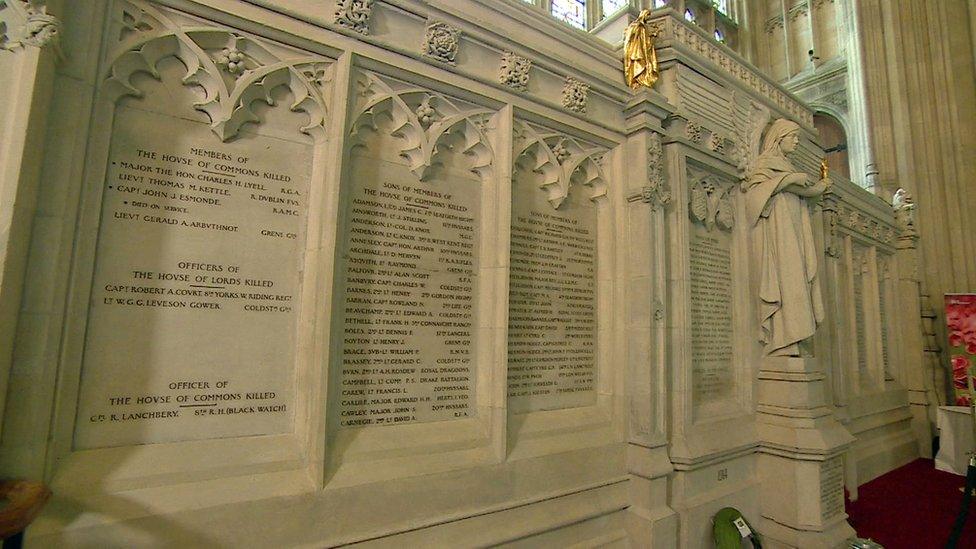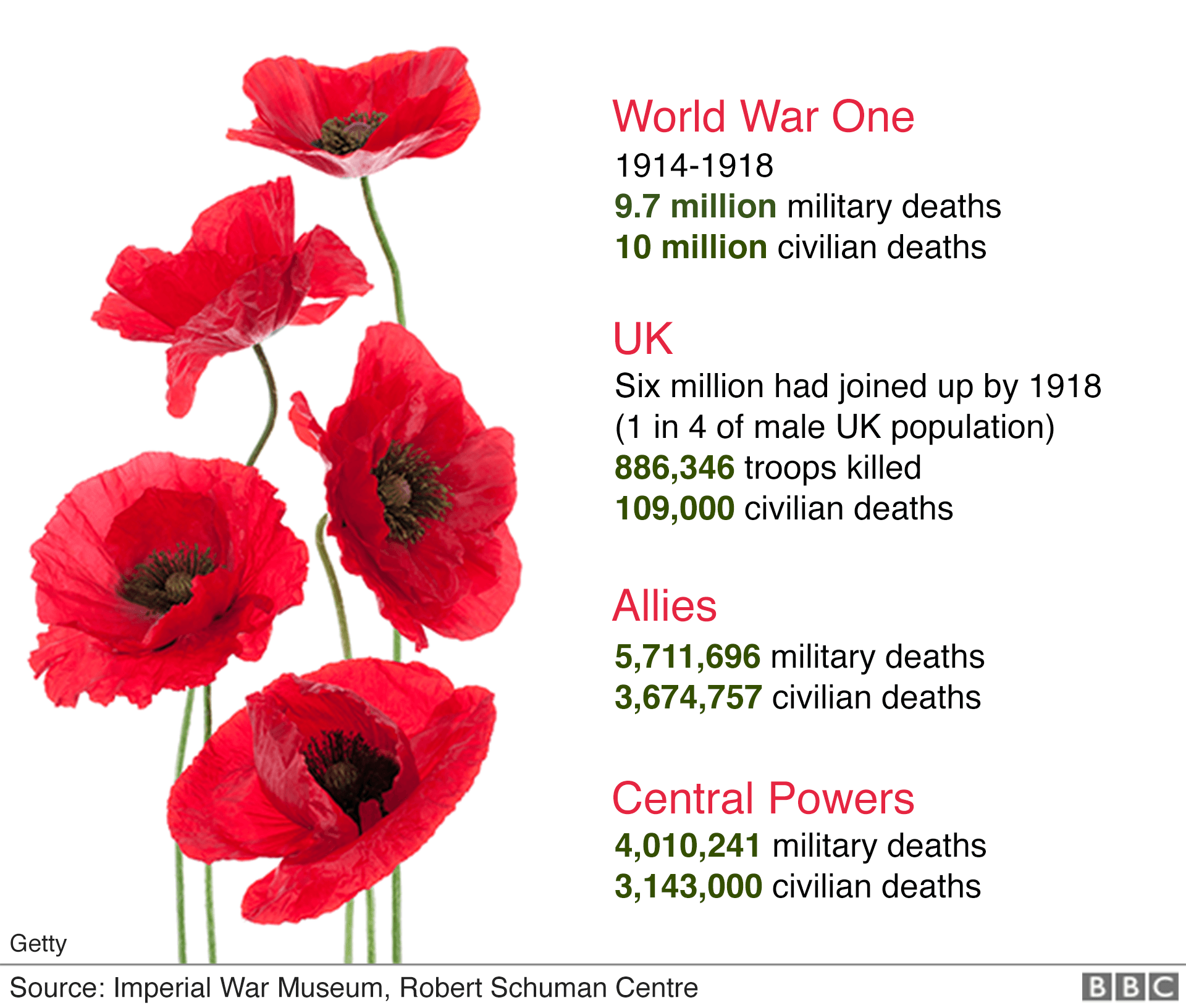Former MP killed in WW1 finally added to Parliament's memorial
- Published
WW1: The forgotten hero MP
A forgotten hero has finally been remembered on Parliament's World War One memorial.
The marble installation recognises the sacrifice of peers, MPs, MPs' sons, and senior officers of Parliament, who died in service during the Great War.
But 96 years after its completion, a leading historian realised one MP had been left off.
Now Lieutenant Gerald Arbuthnot, once the Conservative MP for Burnley, has had his name belatedly added.
The 44-year-old was killed in action in 1916 during the Battle of the Somme.
Dr Kathryn Rix, from the History of Parliament Trust, spotted his name's absence from the memorial and said it's not clear why he was forgotten.
"I think perhaps it was because he wasn't an MP for very long," she said. "Perhaps people didn't remember he was an MP between January and December 1910.
"Also he was a former MP at the time and they weren't originally added to the memorial in 1921.
"But then some former MPs were added in 1922, so really, he should have been added at that time.
"They just forgot him - which is rather sad - but now he is being remembered."

Lt Arbuthnot's name was belatedly added to the memorial, 96 years after its completion

The marble memorial is known as the Recording Angel
The historian had been researching the stories of parliamentarians killed in action during the war when she realised a name was missing from the memorial, known as the Recording Angel, which was designed by Sir Bertram Mackennal in 1921.
She had a list of 24 members and former members of Parliament who had died but noticed only 23 on the memorial in St Stephen's Porch, Westminster Hall.
She said all of Parliament's official documents and guidebooks will now need to be amended, adding: "It's really nice to have added him now. I feel very proud."
After unsuccessfully contesting the seat in 1906, Gerald Arbuthnot was elected as the Conservative MP for Burnley in January 1910. However he lost the seat in December of the same year during a second election.
He chose not to stand again, but remained in politics in other ways until the outbreak of war, when he joined the Navy.
But Dr Rix explained: "He's unusual amongst the MPs who died in that he served in the Navy, He'd served in the Navy as a young man, and at the start of the war he joined the Royal Naval Reserve.
"He was initially with their press bureau, but that wasn't involved enough in the fighting for him. So he joined a minesweeping division and commanded minesweepers in the North Sea for 15 months.
"But he was very keen to go and have active engagement with the enemy. So he secured a commission in the Grenadier guards in January 1916."

By May, the former MP was fighting at Ypres before heading south to the Somme, with the 2nd Battalion of the Grenadier Guards.
On 25 September 1916, he was involved in a second attack on the village of Les Boeufs.
Lt Arbuthnot and three other officers went forward to cut through barbed wire, because it had not been sufficiently damaged by the British artillery bombardment.
Dr Rix explained: "This was a job that they knew meant almost certain death. Arbuthnot and three other officers went forward. Three of them were killed."
The soldier is buried in the Citadel New Military Cemetery in Fricourt.
Despite memorial services for him in Burnley and at St Margaret's Church in Westminster, his name was never added to Parliament's memorial.
With the error noticed just weeks before the 100th anniversary of the Armistice, extended members of Lt Arbuthnot's family have welcomed his name being added.
His distant cousin James - now Lord Arbuthnot - was himself an MP for 28 years.
But in all that time, he never realised the memorial he routinely passed should have carried his relative's name.

The Armistice 100 years on

Long read: The forgotten female soldier on the forgotten frontline
Video: War footage brought alive in colour
Interactive:, external What would you have done between 1914 and 1918?
Living history: Why 'indecent' Armistice Day parties ended

Lord Arbuthnot said: "I didn't know of him, though my brother did - he's the family genealogist.
"It's an extraordinary story. He was part of a generation who truly believed in duty and serving their country.
"It feels very good - an extra bit of knowledge about what members of Parliament, what my family, did in that war has come to light and we can remember him properly now.
"We're very proud. Though I always remember my grandfather who died at Ypres in 1915, to know there was also Gerald Arbuthnot is really very nice.
"There were a number of my family members killed in the First World War. It's just good to be able to join him to the family memory."
In total, 264 MPs or former MPs served in World War One, with 23 of these making the ultimate sacrifice.
In addition, 323 members of the Lords served, with 24 being killed (one of whom was also an MP - meaning some list 24 MPs as having died).
Mark Collins, the Parliamentary estate's archivist and historian, said: "With the work of the History of Parliament Trust, we're sure that we have all of the names of those peers and those MPs and the sons of MPs [who died]. All their names have now been included."